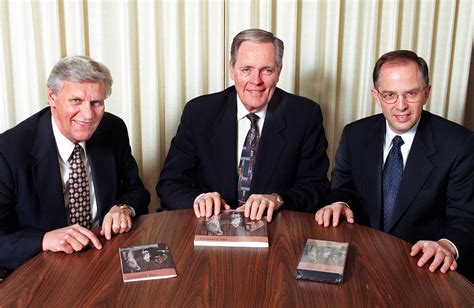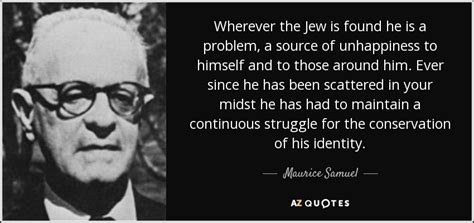A Quote by Florence King
Misanthropes have some admirable if paradoxical virtues. It is no exaggeration to say that we are among the nicest people you are likely to meet. Because good manners build sturdy walls, our distaste for intimacy makes us exceedingly cordial "ships that pass in the night." As long as you remain a stranger we will be your friend forever.
Related Quotes
Into each of our lives come golden moments of adversity. This painful friend breaks our hearts, drops us to our knees, and makes us realize we are nothing without our Lord and Savior. This friend makes us plead all the night long for reassurance and into the next day and sometimes for weeks and months. But, ultimately, just as surely as the day follows the night, as we remain true and faithful, this strange friend, adversity, leads us straight into the outstretched arms of the Savior.
A century of partial tolerance gave us Jews access to your world. In that period the great attempt was made, by advance guards of reconciliation, to bring our two worlds together. It was a century of failure. We Jews, we, the destroyers, will remain the destroyers forever. Nothing that you will do will meet our needs and demands. We will forever destroy because we need a world of our own, a God-world, which it is not in your nature to build
Maybe it’s not, in the end, the virtues of others that so wrenches our hearts as it is the sense of almost unbearably poignant recognition when we see them at their most base, in their sorrow and gluttony and foolishness. You need the virtues, too—some sort of virtues—but we don’t care about Emma Bovary or Anna Karenina or Raskolnikov because they’re good. We care about them because they’re not admirable, because they’re us, and because great writers have forgiven them for it.
Years later, my wife, Ilusion, woke me up to the realization that you can't just "dump" your whole species simply because you've had a few bad encounters with some of its members. ... Intimacy's a greater goal to seek. ...That true knowledge of intimacy within our own species will allow us to pass it along to interspecies relations.
In the 20th century, we built a lot of walls - we endlessly tried to build walls between us and people we perceived, correctly or incorrect, as our enemies. In the 21st century, because of the advent of networks, the free movement of goods and people across the globe, we need to build security by building bridges instead of building walls.
We're a lukewarm people for all our feast days and hard work. Not much touches us, but we long to be touched. We lie awake at night willing the darkness to part and show us a vision. Our children frighten us in their intimacy, but we make sure they grow up like us. Lukewarm like us. On a night like this, hands and faces hot, we can believe that tomorrow will show us angels in jars and that the well-known woods will suddenly reveal another path.
Our children will be born of our actions. Our accidents will become their destinies. Oh, the actions will remain. It is a simple matter of what you will do when the chips are down, my friend. When the fat lady is singing. When the walls are falling in, and the sky is dark, and the ground is rumbling. In that moment our actions will define us. And it makes no difference whether you are being watched by Allah, Jesus, Buddah, or whether you are not. On cold days a man can see his breath, on a hot day he can't. On both occasions, the man breathes.
Doubt is the vestibule which all must pass before they can enter into the temple of wisdom; therefore, when we are in doubt and puzzle out the truth by our own exertions, we have gained a something that will stay by us, and which will serve us again. But, if to avoid the trouble of the search we avail ourselves of the superior information of a friend, such knowledge will not remain with us; we have not bought but borrowed it.
Whether we know it or not, we transmit the presence of everyone we have ever known, as though by being in each other's presence we exchange our cells, pass on some of our lifeforce, and then we go on carrying that person in our body, not unlike springtime when certain plants in fields we walk through attach their seeds in the form of small burrs to our socks, our pants, our caps, as if to say, 'Go on, take us with you, carry us to root in another place.' This is how we survive long after we are dead. This is why it is important who we become, because we pass it on.
[There's] a joke that I've done forever: 'Nowadays they say that the largest majority of people will be Latino and you'll tell scary stories to your grandkids: "A long time ago when I was growing up, there used to be people who were white," and the kid says, "Really?" and you say, "Yeah, like the man who cuts our grass."' I've had that line forever and I love it.
There are among us those that would criticize our Confederate ancestors. Would you allow a stranger to come into your house and criticize your little ones? I say it's not whether we should be ashamed of our fathers and mothers of the Old Confederacy. I say it's a question of whether they should be ashamed of us.






































